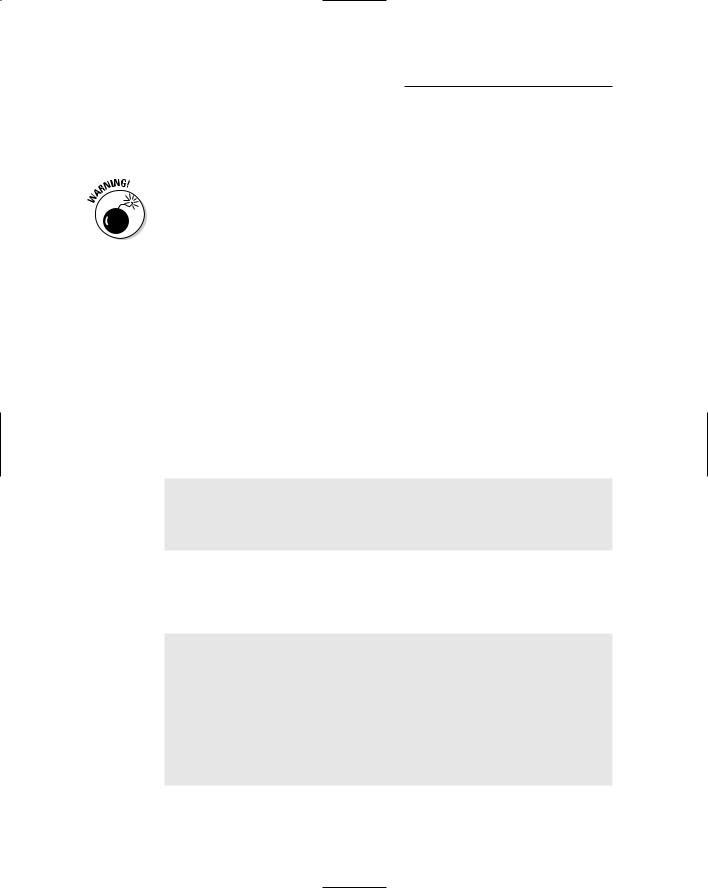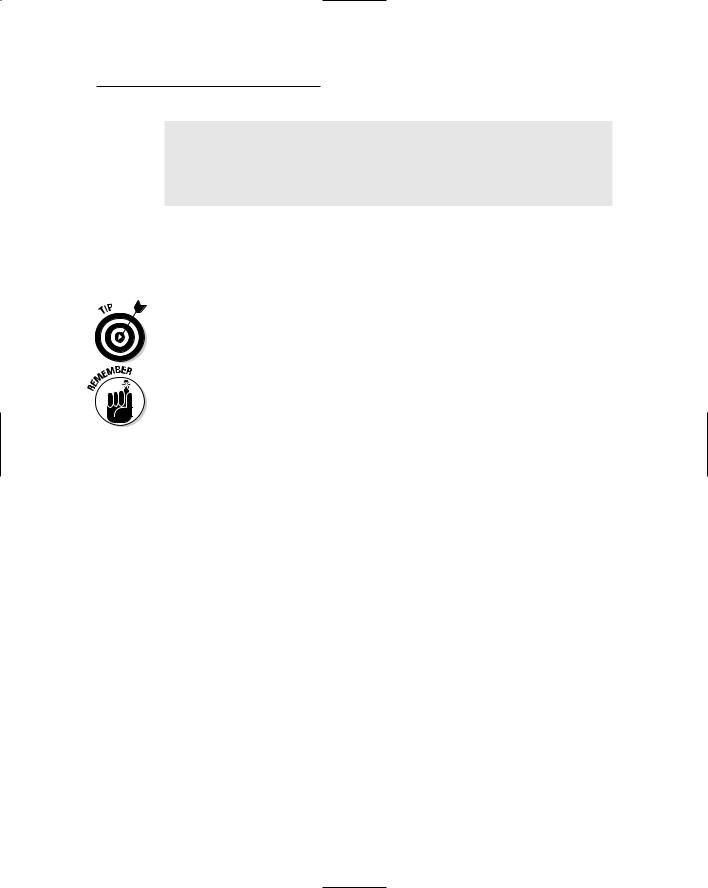
- •Table of Contents
- •Introduction
- •What Is C++?
- •Conventions Used in This Book
- •How This Book Is Organized
- •Part I: Introduction to C++ Programming
- •Part III: Introduction to Classes
- •Part IV: Inheritance
- •Part V: Optional Features
- •Part VI: The Part of Tens
- •Icons Used in This Book
- •Where to Go from Here
- •Grasping C++ Concepts
- •How do I program?
- •Installing Dev-C++
- •Setting the options
- •Creating Your First C++ Program
- •Entering the C++ code
- •Building your program
- •Executing Your Program
- •Dev-C++ is not Windows
- •Dev-C++ help
- •Reviewing the Annotated Program
- •Examining the framework for all C++ programs
- •Clarifying source code with comments
- •Basing programs on C++ statements
- •Writing declarations
- •Generating output
- •Calculating Expressions
- •Storing the results of expression
- •Declaring Variables
- •Declaring Different Types of Variables
- •Reviewing the limitations of integers in C++
- •Solving the truncation problem
- •Looking at the limits of floating-point numbers
- •Declaring Variable Types
- •Types of constants
- •Special characters
- •Are These Calculations Really Logical?
- •Mixed Mode Expressions
- •Performing Simple Binary Arithmetic
- •Decomposing Expressions
- •Determining the Order of Operations
- •Performing Unary Operations
- •Using Assignment Operators
- •Why Mess with Logical Operations?
- •Using the Simple Logical Operators
- •Storing logical values
- •Using logical int variables
- •Be careful performing logical operations on floating-point variables
- •Expressing Binary Numbers
- •The decimal number system
- •Other number systems
- •The binary number system
- •Performing Bitwise Logical Operations
- •The single bit operators
- •Using the bitwise operators
- •A simple test
- •Do something logical with logical calculations
- •Controlling Program Flow with the Branch Commands
- •Executing Loops in a Program
- •Looping while a condition is true
- •Using the for loop
- •Avoiding the dreaded infinite loop
- •Applying special loop controls
- •Nesting Control Commands
- •Switching to a Different Subject?
- •Writing and Using a Function
- •Divide and conquer
- •Understanding the Details of Functions
- •Understanding simple functions
- •Understanding functions with arguments
- •Overloading Function Names
- •Defining Function Prototypes
- •Variable Storage Types
- •Including Include Files
- •Considering the Need for Arrays
- •Using an array
- •Initializing an array
- •Accessing too far into an array
- •Using arrays
- •Defining and using arrays of arrays
- •Using Arrays of Characters
- •Creating an array of characters
- •Creating a string of characters
- •Manipulating Strings with Character
- •String-ing Along Variables
- •Variable Size
- •Address Operators
- •Using Pointer Variables
- •Comparing pointers and houses
- •Using different types of pointers
- •Passing Pointers to Functions
- •Passing by value
- •Passing pointer values
- •Passing by reference
- •Limiting scope
- •Examining the scope problem
- •Providing a solution using the heap
- •Defining Operations on Pointer Variables
- •Re-examining arrays in light of pointer variables
- •Applying operators to the address of an array
- •Expanding pointer operations to a string
- •Justifying pointer-based string manipulation
- •Applying operators to pointer types other than char
- •Contrasting a pointer with an array
- •Declaring and Using Arrays of Pointers
- •Utilizing arrays of character strings
- •Identifying Types of Errors
- •Choosing the WRITE Technique for the Problem
- •Catching bug #1
- •Catching bug #2
- •Calling for the Debugger
- •Defining the debugger
- •Finding commonalities among us
- •Running a test program
- •Single-stepping through a program
- •Abstracting Microwave Ovens
- •Preparing functional nachos
- •Preparing object-oriented nachos
- •Classifying Microwave Ovens
- •Why Classify?
- •Introducing the Class
- •The Format of a Class
- •Accessing the Members of a Class
- •Activating Our Objects
- •Simulating real-world objects
- •Why bother with member functions?
- •Adding a Member Function
- •Creating a member function
- •Naming class members
- •Calling a Member Function
- •Accessing a member function
- •Accessing other members from a member function
- •Defining a Member Function in the Class
- •Keeping a Member Function After Class
- •Overloading Member Functions
- •Defining Arrays of and Pointers to Simple Things
- •Declaring Arrays of Objects
- •Declaring Pointers to Objects
- •Dereferencing an object pointer
- •Pointing toward arrow pointers
- •Passing Objects to Functions
- •Calling a function with an object value
- •Calling a function with an object pointer
- •Calling a function by using the reference operator
- •Returning to the Heap
- •Comparing Pointers to References
- •Linking Up with Linked Lists
- •Performing other operations on a linked list
- •Hooking up with a LinkedListData program
- •A Ray of Hope: A List of Containers Linked to the C++ Library
- •Protecting Members
- •Why you need protected members
- •Discovering how protected members work
- •Protecting the internal state of the class
- •Using a class with a limited interface
- •Creating Objects
- •Using Constructors
- •Why you need constructors
- •Making constructors work
- •Dissecting a Destructor
- •Why you need the destructor
- •Working with destructors
- •Outfitting Constructors with Arguments
- •Justifying constructors
- •Using a constructor
- •Defaulting Default Constructors
- •Constructing Class Members
- •Constructing a complex data member
- •Constructing a constant data member
- •Constructing the Order of Construction
- •Local objects construct in order
- •Static objects construct only once
- •Global objects construct in no particular order
- •Members construct in the order in which they are declared
- •Destructors destruct in the reverse order of the constructors
- •Copying an Object
- •Why you need the copy constructor
- •Using the copy constructor
- •The Automatic Copy Constructor
- •Creating Shallow Copies versus Deep Copies
- •Avoiding temporaries, permanently
- •Defining a Static Member
- •Why you need static members
- •Using static members
- •Referencing static data members
- •Uses for static data members
- •Declaring Static Member Functions
- •What Is This About, Anyway?
- •Do I Need My Inheritance?
- •How Does a Class Inherit?
- •Using a subclass
- •Constructing a subclass
- •Destructing a subclass
- •Having a HAS_A Relationship
- •Why You Need Polymorphism
- •How Polymorphism Works
- •When Is a Virtual Function Not?
- •Considering Virtual Considerations
- •Factoring
- •Implementing Abstract Classes
- •Describing the abstract class concept
- •Making an honest class out of an abstract class
- •Passing abstract classes
- •Factoring C++ Source Code
- •Defining a namespace
- •Implementing Student
- •Implementing an application
- •Project file
- •Creating a project file under Dev-C++
- •Comparing Operators with Functions
- •Inserting a New Operator
- •Overloading the Assignment Operator
- •Protecting the Escape Hatch
- •How Stream I/O Works
- •The fstream Subclasses
- •Reading Directly from a Stream
- •Using the strstream Subclasses
- •Manipulating Manipulators
- •Justifying a New Error Mechanism?
- •Examining the Exception Mechanism
- •What Kinds of Things Can I Throw?
- •Adding Virtual Inheritance
- •Voicing a Contrary Opinion
- •Generalizing a Function into a Template
- •Template Classes
- •Do I Really Need Template Classes?
- •Tips for Using Templates
- •The string Container
- •The list Containers
- •Iterators
- •Using Maps
- •Enabling All Warnings and Error Messages
- •Insisting on Clean Compiles
- •Limiting the Visibility
- •Avoid Overloading Operators
- •Heap Handling
- •Using Exceptions to Handle Errors
- •Avoiding Multiple Inheritance
- •Customize Editor Settings to Your Taste
- •Highlight Matching Braces/Parentheses
- •Enable Exception Handling
- •Include Debugging Information (Sometimes)
- •Create a Project File
- •Customize the Help Menu
- •Reset Breakpoints after Editing the File
- •Avoid Illegal Filenames
- •Include #include Files in Your Project
- •Executing the Profiler
- •System Requirements
- •Using the CD with Microsoft Windows
- •Using the CD with Linux
- •Development tools
- •Program source code
- •Index

Chapter 8: Taking a First Look at C++ Pointers 121
Execution begins with main(). The function main() immediately invokes parent(). The first thing that the processor sees in parent() is the declara tion of intParent. At that point, intParent goes into scope — that is, intParent is defined and available for the remainder of the function parent().
The second statement in parent() is the call to child(). Once again, the function child() declares a local variable, this time intChild. The variable intChild is within the scope of child(). Technically, intParent is not within the scope of child() because child() doesn’t have access to intParent; however, the variable intParent continues to exist.
When child() exits, the variable intChild goes out of scope. Not only is intChild no longer accessible, but it no longer even exists. (The memory occupied by intChild is returned to the general pool to be used for other things.)
As parent() continues executing, the variable intLater goes into scope at the declaration. At the point that parent() returns to main(), both intParent and intLater go out of scope. The programmer may declare a variable outside of any function. This type of variable, known as a global variable, remains in scope for the duration of the program.
Because intGlobal is declared globally in this example, it is available to all three functions and remains available for the life of the program.
Examining the scope problem
The following code segment compiles without error but doesn’t work (don’t you just hate that):
double* child(void)
{
double dLocalVariable; return &dLocalVariable;
}
void parent(void)
{
double* pdLocal; pdLocal = child(); *pdLocal = 1.0;
}
The problem with this function is that dLocalVariable is defined only within the scope of the function child(). Thus, by the time the memory address

122 Part II: Becoming a Functional C++ Programmer
of dLocalVariable is returned from child(), it refers to a variable that no longer exists. The memory that dLocalVariable formerly occupied is proba bly being used for something else.
This error is very common because it can creep up in a number of different ways. Unfortunately, this error does not cause the program to instantly stop. In fact, the program may work fine most of the time — that is, the program continues to work as long as the memory formerly occupied by dLocalVariable is not reused immediately. Such intermittent problems are the most difficult ones to solve.
Providing a solution using the heap
The scope problem originated because C++ took back the locally defined memory before the programmer was ready. What is needed is a block of memory controlled by the programmer. She can allocate the memory and put it back when she wants to — not because C++ thinks it’s a good idea. Such a block of memory is called the heap.
Heap memory is allocated using the new command followed by the type of object to allocate. For example, the following allocates a double variable off the heap.
double* child(void)
{
double* pdLocalVariable = new double; return pdLocalVariable;
}
Although the variable pdLocalVariable goes out of scope when the func tion child() returns, the memory to which pdLocalVariable refers does not. A memory location returned by new does not go out of scope until it is explicitly returned to the heap using a delete command:
void parent(void)
{
//child() returns the address of a block
//of heap memory
double* pdMyDouble = child();
//store a value there *pdMyDouble = 1.1;
//...

Chapter 8: Taking a First Look at C++ Pointers 123
//now return the memory to the heap delete pdMyDouble;
pdMyDouble = 0;
//...
}
Here the pointer returned by child() is used to store a double value. After the function is finished with the memory location, it is returned to the heap. The function parent() sets the pointer to zero after the heap memory has been returned — this is not a requirement, but a very good idea. If the pro grammer mistakenly attempts to store something in * pdMyDouble after the delete, the program will crash immediately.
A program that crashes immediately upon encountering an error is much easier to fix than one that is intermittent in its behavior.
The whole problem of allocating and returning heap memory goes away in Visual C++.NET–managed mode. Managed refers to the fact that C++ handles the allocation and deallocation of memory references. This book deals only with unmanaged mode Visual C++.NET programs.

124 Part II: Becoming a Functional C++ Programmer
